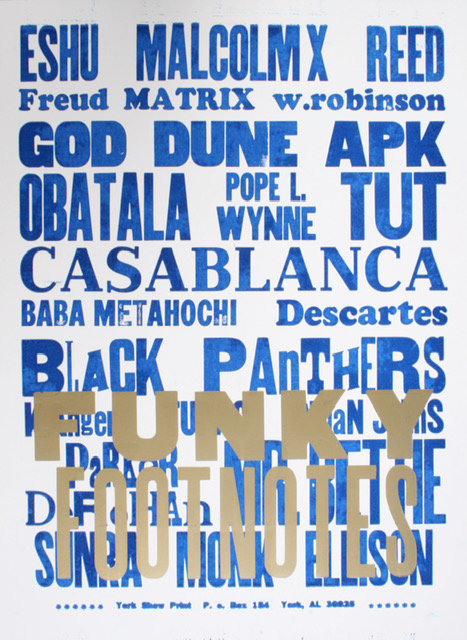Study Room
Study Room (English)

Carl Pope Jr.,The Bad Air Smelled of Roses, 2004-ongoing
Letterpress poster
with contributions by manuel arturo abreu, Greg de Cuir Jr., Mireille Ngosso, Carl Pope Jr., Morgan Quaintance, Danielle Brathwaite-Shirley, Paige Taul
During the two solo exhibitions by Kevin Jerome Everson and Doreen Garner (September 3 – November 14, 2021), the basement foyer before the exhibition gallery will become a Study Room with custom-made furniture for this purpose. The idea behind this format is to create a physical and discursive space that connects the two exhibitions, and for which artists and theorists have produced new content.
The Study Room is also accessible via the website of HALLE FÜR KUNST Steiermark as a virtual space making the contents presented on site in Graz available to a global audience. The Study Room is characterized by contributions of varying durations. While the works of manuel arturo abreu are available on site and in the virtual space for the entire duration of the exhibitions, there are other works that are available for shorter time periods, such as curated film series and the presentation of purely digital works on the website. The Study Room aims on the one hand to provide the space for the large amount of material available, all with direct points of reference to the two artists Kevin Jerome Everson und Doreen Garner. On the other hand, there are also contents that bring the local context into the discussion, addressing the conditions of black lives in Austria. This includes the contribution by Mireille Ngosso, politician and activist, who critically examines the myth that Austria had nothing to do with colonialism, as the country had no own colonies in the nineteenth and twentieth centuries. Above all at the end of the nineteenth century, Austria had its own colonial business and trade relations that made it significantly involved in the exploitation of other countries.
By addressing these themes, impetus to a reassessment of the own history can be given. Gayatri Spivak, one of the most important founders of post-colonial feminism, writes about the right to speak of others from a position of privilege, noting that this must first be acquired by gaining and appropriating knowledge.1 For this, it is necessary to critically reflect the own position with reference to historical conditions. Many global institutions within and beyond the field of contemporary art are now in the process of this realization. The Study Room is a sign that this process is taking place and a marker of these discussions, and of the current status of our learning and results.
Contributors
manuel arturo abreu (*1991 Santo Domingo, lives in Portland, Oregon) is a non-disciplinary and non-binary artist and poet. They are contributing two performative video lectures titled An Alternative History of Abstraction (2020) and Debajo del Agua: the wake work of Enerolisa Nuñez (2021). In addition abreu has written a new text piece on Chief Suzanne Wenger (*1915 Graz, †2009 Oshogbo) an Austrian-Nigerian artist born in Graz and priest of the Yoruba religion mostly practiced in Nigeria.
Greg de Cuir Jr. (*Los Angeles, lives in Belgrade) is an independent curator, film scholar, writer and longtime collaborator of Everson. On the occasion of the opening of the exhibition Recover by Kevin Jerome Everson, de Cuir Jr. gives a talk together with the artist discussing three films by Austrian filmmakers and artists Valie Export, Kurt Kren and Peter Kubelka. An edited sound piece will be available on the Study Room’s webpage. In addition de Cuir Jr. wrote a new text titled Arsenic and No Lace, a personal encounter on how both first met and a mediation on one of Everson’s major pieces Sugarcoated Arsenic (2014).
Mireille Ngosso (*1980 Kinshasa, lives in Vienna) is a doctor, politician and activist. Currently she is working as municipal councilwoman for the Austrian Social Democratic Party. On the occasion of both exhibitions, Ngosso will hold a lecture in late September on the Colonial History of Austria at the institution. An edited audio piece will be available on the Study Room’s webpage.
Morgan Quaintance (*1979 London, lives in London) is an artist, author and filmmaker. Within the frame of the Study Room he will present his recent film Another Decade (2018) in which Quaintance brings together different discourses from the fields of art history, cultural anthropology, and gender studies. Among other things, he engages with the issue of discrimination against minorities, with a main focus on past and present statements by artists, theorists, and other cultural producers on the theme of being different.
Paige Taul (*1996 Berkeley, lives in Chicago) is a film maker and scholar. Her work engages with and challenges assumptions of black cultural expression and notions of belonging through experimental cinematography. Within the frame of the Study Room, Taul will present the films I am (2017), In the face of god (2018) and 10:28,30 (2019).
Carl Pope Jr. (*1961 Indianapolis, lives in Indianapolis) is an artist who addresses issues related to race in America, specifically the social conditions of African Americans. In the Study Room on site at the institution Pope Jr. is presenting one of his major works titled The Bad Air Smelled of Roses (2004-ongoing), a series of letter-press posters as graphic essay that maps the “ubiquitous presence and function of blackness in society and nature.” The work currently consists of 108 letterpress posters, each with a text selected by the artist as an answer to the question “What do I think of when I think of being black?.”
Danielle Brathwaite-Shirley (lives in London) is an artist working predominantly in animation, sound, performance and video games to communicate the experiences of being a Black Trans person. Brathwaite-Shirley is presenting the new Video Game Resurrection Lands (2020) which will be available online on the Study Rooms webpage within the last two weeks of October.
For more information on the artists, contributions and dates, please check the Study Room’s webpage: www.halle-fuer-kunst.at/studyroom/
- ^ Gayatri Spivak, The Post-Colonial Critic: Interviews, Strategies, Dialogues, New York: Routledge, 1990.